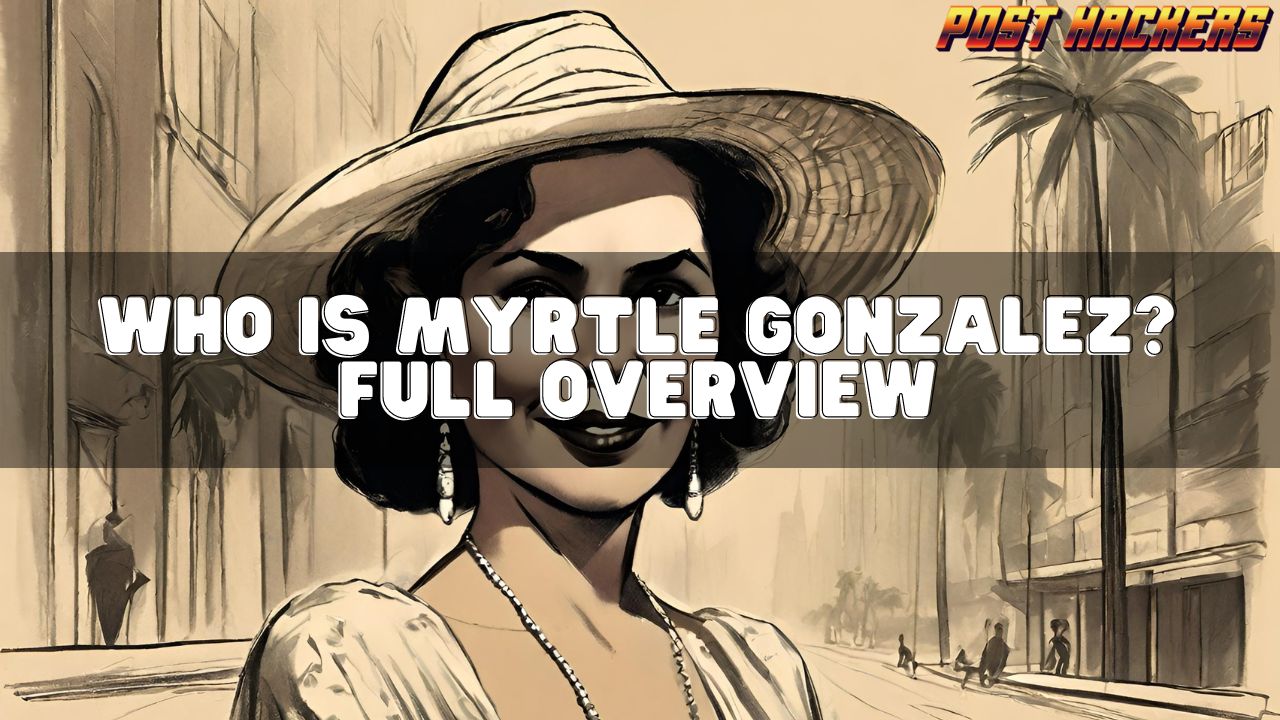An Overview of Myrtle Gonzalez
Known as the “First Latin American Movie Star,” Myrtle Gonzalez was a trailblazer in the early years of Hollywood. Myrtle was born on September 28, 1891, in Los Angeles, California, to parents who were immigrants from Mexico. Her ascent to fame was nothing short of extraordinary.
Myrtle has a passion for entertainment and performing from an early age. She started performing at local gatherings, where she sang and danced, and her skill was soon noticed. Her major break came when she was cast as a local theatrical performance and was noticed by director Thomas Ince.
Myrtle made her screen debut in the silent western picture “The Invaders” (1912) at the age of only 19. This launched her into a lucrative Hollywood career. She starred in more than 80 movies throughout the next ten years, such as “One Law for Both” (1917), “The Serpent” (1916), and “The Easter Lily” (1915).
Myrtle swiftly gained popularity as one of the most well-liked actors of her day because to her attractiveness and charisma. Her vibrant personality and humorous timing were often highlighted in her performances, which led to her being dubbed “La Única,” or “the unique one.”
Myrtle was not just a gifted actress but also a pioneer for women in the motion picture business. During a period when female actors were often categorized as femme fatales or damsels in distress, Myrtle embraced more dynamic parts that subverted gender norms.
Early Years and the Start of a Career
On September 28, 1891, Myrtle Gonzalez was born in Los Angeles, California. Her parents, Francisco Gonzalez and Maria Rodriguez, were immigrants from Mexico, and she was the youngest of their five children. Her mother was a stay-at-home mom, while her father was a carpenter.
During her childhood, Myrtle was exposed to several cultures and languages due to her upbringing in the bustling metropolis of Los Angeles. She picked up English from her classmates and Spanish from her parents while growing up in a multicultural area.
Myrtle’s life was drastically altered at the age of 14 when she happened to meet a touring vaudeville team that was performing at her school. She persuaded her parents to allow her to join the company as an assistant after being pulled to the theater right away. Her love for acting was ignited by this, and she decided she wanted to make acting her profession.
Career Start-Up
Myrtle began to hone her acting abilities by appearing in small Los Angeles theaters. She also studied dance and became skilled in ballet and flamenco, among other dance forms.
At the age of 20, Myrtle made her screen debut in D.W. Griffith’s “The Immigrant” in 1911. Despite having just a little supporting part, it was the start of her prosperous Hollywood career.
Myrtle acted in a number of silent movies during the next years, such as “The Little American” (1917), starring Mary Pickford, and “E
Gain Notoriety in Silent Films
Known as “The Virgin of the Silver Screen,” Myrtle Gonzalez was a Mexican-American actress who became well-known in the early 1900s for her mesmerizing roles in silent films. Myrtle’s ability and perseverance enabled her to rise from modest parts at the beginning of her career—along with the dearth of possibilities for Hispanic performers at the time—to become one of the most sought-after actresses of her generation.
Born in Los Angeles, California on September 28, 1891, Myrtle was brought up by her American father and Spanish mother. She was raised in a multicultural neighborhood, where she quickly fell in love with acting and often participated in neighborhood theater plays. Film producer Mack Sennett was drawn to her effortless elegance and composure and extended an offer of a contract to work for his firm, Keystone Studios.
Myrtle debuted in a motion picture in 1913 with the short “Giving Them Fits.” Despite being a little part, it signaled the start of an extraordinary career that would last for more than 20 years. Her ability to emote without using words and her expressive eyes gained her notoriety fast. As a result, she was able to play increasingly important parts in feature films like The Silent Witness (1917) and Love’s Forgiveness (1915).
But Myrtle didn’t become well-known until she co-starred in the comedy “Fatty’s Plucky Pup” (1915) with famous comic Roscoe “Fatty” Arbuckle. They had unquestionable chemistry on film and they went
Relationships and Personal Life
Relationships and Myrtle Gonzalez’s personal life had a big impact on who she was as a person and an actor. Her parents were Mexican, and she was born in Los Angeles, California on September 28, 1891. Myrtle’s passion of performance was evident from an early age, since her mother was a singer and her father was a theatrical performer.
Myrtle grew up in close proximity to her family and often went to see her parents perform. She made her theatrical debut at the age of sixteen, earning praise for her acting abilities. However, she didn’t become well-known until she started working in the film business.
Regarding romantic partnerships, Myrtle was married twice throughout her lifetime. In 1913, she wed George Marshall, a silent film director, for the first time. After six years of marriage, they finally got divorced because of differences in their personalities. Myrtle remarried to cinematographer Allen McNeil in 1929, and the two of them stayed together until his death in 1950.
Myrtle persevered in her optimistic attitude and commitment to her job in spite of the difficulties in her romantic life. She also maintained close relations with other actors in the business, such as Ramona Novarro and Dolores Del Rio.
Myrtle’s sense of style was one area of her private life that often attracted media attention. During the silent cinema period, Myrtle gained notoriety for her sleek and trendy appearance on and off screen, earning her a place in fashion history.
The Myrtle Gonzalez Legacy
Actors and actresses in the film business are still motivated and influenced by the legacy of Myrtle Gonzalez. She broke down boundaries for representation in the entertainment industry and paved the path for future Latinx artists as one of the first Mexican-American actors to achieve success in Hollywood.
Myrtle Gonzalez was born in Los Angeles, California, on September 28, 1891, and she was born into a celebrity that was inevitable. Her father was a well-liked theater manager, and her mother performed in plays. It was not surprising that Myrtle fell in love with acting at a young age. At the early age of three, she made her theatrical debut, and she continued to perform throughout her youth.
Following her high school graduation, Myrtle concentrated on pursuing a full-time acting career. Before film producer Thomas Ince saw her, she had a string of tiny appearances in silent films. Myrtle’s skill was recognized by Ince, who gave her the main part in his film “A War-Time Widow” (1915). Her ascent to fame and her career as one of Hollywood’s leading women began with this.
Myrtle became an instant fan favorite because to her attractiveness, charm, and innate acting talent. Because of her performance as Milly Erne in “The Virginian,” she gained notoriety as “The Virginian Beauty” (1914). She acted beside some of Hollywood’s top stars in the 1910s, including Douglas Fairbanks Sr. and William S. Hart.
Disputes and Scandals
Celebrities’ life often include scandals and controversies, and Myrtle Gonzalez was no exception. She had a prosperous career in Hollywood, but she was not exempt from scandals involving her personal life.
A notorious controversy involving Myrtle Gonzalez pertained to her association with filmmaker Herbert Blaché. Blaché was married to one of the early film pioneers, Alice Guy-Blaché, during the time. But in the end, his romance with Myrtle caused him to file for divorce from Alice in 1922. The controversy damaged Blaché’s and Myrtle’s reputations and created quite a stir in Hollywood.
Myrtle Gonzalez’s Mexican ancestry was the subject of yet another scandal that dogged her throughout her career. She had Spanish origins and was born in Los Angeles, yet she often encountered prejudice because of her looks and last name. During a period when Mexican Americans were not largely welcomed in Hollywood, Myrtle found it difficult to escape clichéd parts like “the exotic temptress” or “the fiery Latina.”
In addition, there were speculations about Myrtle’s romantic life. She had a reputation for being quite flirty on set and had romantic relationships with a number of her co-stars. One of these alleged romances included the then-biggest celebrity in Hollywood, Francis X. Bushman, an actor. Their supposed relationship created quite a stir even though it was never verified since Bushman was married at the time.
Apart from these disputes, there were other scandals that afflicted
Impact on pop culture and Hollywood
Early in the 20th century, Myrtle Gonzalez—also referred to as “the American Beauty”—was an actress in silent films. She had a short career, yet she had a significant impression on Hollywood and popular culture that continues to this day.
Her first role in the 1914 motion picture “The Count of Monte Cristo” marked the beginning of her ascent to stardom. Audiences and reviewers alike were soon drawn to her natural beauty and fascinating on-screen persona. With every successive part, her fame increased even more, making her one of the most sought-after actresses of her day.
Gonzalez’s groundbreaking work in establishing the stereotype of female characters in movies is indicative of her impact on Hollywood. Women were often represented as femme fatales or damsels in peril before her. But Gonzalez challenged social standards and opened the door for more female protagonists by adding nuance and complexity to her characters.
She also paved the way for Latinx representation in Hollywood. She broke down boundaries and provided opportunities for other minority artists as one of the first prominent Mexican-American actors. She dispelled myths and demonstrated that individuals from different origins might succeed in a field where white actors predominate.
Gonzalez had a big effect on pop culture throughout her lifetime, therefore her influence went beyond Hollywood. Fans all around America were enamored with her beauty, and her distinctive style served as an inspiration for fashion trends. Gonzalez’s sense of style, which extended to haircuts and wardrobe selections, became well-known among young ladies who aspired to look like
Paying Homage to Myrtle Gonzalez: Awards and Tribute
As the first Latin American cinema star, Myrtle Gonzalez was a gifted actress whose legacy is still cherished and embraced today. She set the path for next generations of Latino performers and made a lasting impression on the film industry during her brief but fruitful career in Hollywood.
We shall examine in more detail the awards and tributes given to Myrtle Gonzalez over the years in this section. See how her contributions to film are still acknowledged and honored, from major honors to memorial ceremonies.
Award Posthumously
Myrtle Gonzalez passed away suddenly at the age of 27, yet her brilliance was not forgotten. In fact, she was honored with a posthumous Oscar for her roles in many motion pictures. She received a Bronze Plaque from Photoplay Magazine in 1919 for one of her best-ever performances in the part of “The Mexican.”
She also received an honorable medal from Alma de Mexico magazine in 1920 for being deemed “the most beautiful woman in Mexico.” These honors provide witness to Myrtle’s influence on viewers in both Latin America and the United States.
The Hollywood Walk of Fame star
Myrtle Gonzalez received a star on the Hollywood Walk of Fame in 1960. This honor, which is only given to actors who have significantly impacted the entertainment business, is regarded as one of the greatest recognitions an actor can get.
The address is 6357 Hollywood
In summary
To sum up, Myrtle Gonzalez was a trailblazing actress in the early days of Hollywood and had a big influence on the direction of the motion picture business. She persevered in her commitment to her profession in the face of many setbacks and difficulties, and she established a legacy that continues to motivate next generations of performers and actresses. She is a significant person in the entertainment industry due to her indisputable influence on the history of film. As one of the earliest Mexican-American stars in Hollywood, Myrtle Gonzalez will always be recognized for her skill, tenacity, and love of performing.
















